|
|
|
Sort Order |
|
|
|
Items / Page
|
|
|
|
|
|
|
| Srl | Item |
| 1 |
ID:
172469
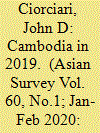

|
|
|
|
|
| Summary/Abstract |
In 2019, Cambodia saw long-ruling Prime Minister Hun Sen tighten his grip on power. Economic growth continued, but with rising risks related to a real estate bubble, mounting debt, and yawning social inequality. Externally, Cambodia deepened its dependency on China, insulating the Hun Sen regime in some respects but contributing to new vulnerabilities.
|
|
|
|
|
|
|
|
|
|
|
|
|
|
|
|
| 2 |
ID:
179250
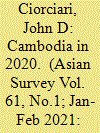

|
|
|
|
|
| Summary/Abstract |
In 2020, Cambodia experienced its sharpest economic contraction in more than a quarter-century as COVID-19 crippled its tourism industry, hampered foreign investment, and reduced demand for exports from its crucial garment and textile sectors. Wary of simmering popular unrest, the government of long-serving Prime Minister Hun Sen sought to support the battered economy with one hand while stifling domestic political dissent with the other. Domestic crackdowns brought further erosion of Cambodia’s ties with the European Union, and relations with the United States and some Southeast Asian neighbors remained tense as Cambodia drifted closer into a dependent relationship with China.
|
|
|
|
|
|
|
|
|
|
|
|
|
|
|
|
| 3 |
ID:
134699
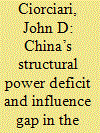

|
|
|
|
|
| Summary/Abstract |
As China rises, its influence on other states’ policy choices will depend partly on the extent of its “structural power.” This article examines China’s role in Asian monetary affairs and argues that deficient structural power has contributed to a significant gap between China’s waxing economic resources and its policy influence.
|
|
|
|
|
|
|
|
|
|
|
|
|
|
|
|
| 4 |
ID:
137782


|
|
|
|
|
| Summary/Abstract |
Despite extensive economic ties and political engagement throughout Asia and sizable investment in some of the region's most vulnerable regimes, China has yet to develop a stable of devoted client states. This article argues that both strategic and normative factors militate against China's cultivation of strong patron–client pacts. The article then uses the case of Cambodia to illustrate these arguments, analyzing how that partnership has developed and its important limitations.
|
|
|
|
|
|
|
|
|
|
|
|
|
|
|
|
| 5 |
ID:
185886
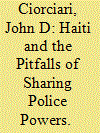

|
|
|
|
|
| Summary/Abstract |
This article examines the benefits and pitfalls of international policing in Haiti over the past quarter century. It shows the importance of the political foundations for joint policing arrangements. Haiti's experience illustrates that international personnel can provide useful stopgap policing services when the interests of national and international partners converge around public order crises. However, the Haitian case also shows how weak political commitment on one or both sides can lead to vague mandates, poor cooperation in the field, weak police accountability, and stalled domestic reforms. These problems have undermined the performance of international personnel and the Haitian National Police, eroding public trust in both. Ultimately, international intervention has failed to yield a capable, trusted, and apolitical Haitian police force or a notably stronger rule of law. Haiti thus offers a cautionary tale for international policing.
|
|
|
|
|
|
|
|
|
|
|
|
|
|
|
|
| 6 |
ID:
147912
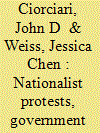

|
|
|
|
|
| Summary/Abstract |
While the existing literature emphasizes that elites often have incentives to pander to nationalist sentiment, much less attention has been paid to elite efforts to subdue popular nationalism, either to avoid domestic instability or international escalation. This article examines how different governments respond to nationalist protests and the resulting effects on the risk that interstate disputes will escalate to armed conflict. We argue that government responses to nationalist protests tend to vary in patterned ways across regime types. Nationalist protests present particular dangers in weakly institutionalized democracies, where demonstrations often pose serious threats of instability but are difficult or costly for the government to subdue, tempting or forcing leaders to escalate to appease domestic critics. We illustrate the theory with four cases representing a range of regime types: Vietnam, Cambodia, Thailand, and the Philippines.
|
|
|
|
|
|
|
|
|
|
|
|
|
|
|
|
| 7 |
ID:
174330
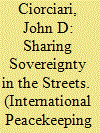

|
|
|
|
|
| Summary/Abstract |
Bolstering basic law enforcement is a major aim of most contemporary peacekeeping missions. In some cases, when local police forces have failed, governments have allowed international personnel to step into the breach and share law enforcement authority with the state. These ‘sovereignty-sharing’ ventures have had two prime mandates – to provide effective stopgap security and strengthen domestic police institutions. This article argues that external actors sometimes have provided useful emergency services, largely through paramilitary policing, but have struggled greatly to model effective general law enforcement and embed durable domestic reforms. A major reason is that most joint policing ventures have been built on precarious political foundations. Although national and international interests sometimes have converged amid security crises, the partners’ commitments generally have waned or diverged regarding ordinary community policing and institutional reform. This has contributed to ambiguous agreements and undermined cooperation in the field, as well as efforts to embed sustainable domestic reform.
|
|
|
|
|
|
|
|
|
|
|
|
|
|
|
|
|
|
|
|
|